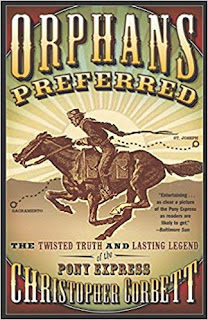 |
| Cover of the 2004 paperback edition. Image found on the internet. |
"The path of the Pony Express crossed what is today eight states and virtually every terrain imaginable, from amber waves of grain to sand hills to high sierra to alkali desert - from Missouri into Kansas, Nebraska, Colorado, Wyoming, Utah, Nevada, and California." - Orphans Preferred, Page 46The vast interior of North America in the 1800s was empty of European civilization. No cities, no roads, no interstate highway system. The telegraph and rail roads would come later, and civilization would inevitably follow. Until then, it was Indian land, and the white man was just passing through in an often lethal attempt to keep communication open between the coasts of a the young United States via the legendary Pony Express.
Orphans Preferred, by Christopher Corbett, follows the history of the Pony Express from inception to eventual closure and is parts epic history, social study, and intimate look into the often short life of the young men - often just boys - who rode the express. It does an admirable job of highlighting all that in an easy and captivating manner.
The far more compelling aspect of this book lays in one's own juxtaposition from modern day comforts to the brutal expectations of a much harder (and now lost to us) people. How the west was won could only have happened through the toughest, hardiest, people that ever lived, and done through near force of will alone.
The title of the book itself refers to the hiring notice placed in newspapers at the time: Orphans Preferred. The riders of the Pony Express were essentially engaging in a suicide mission where an anonymous death was to eventually be expected. It would be best if the rider did not have family who would dwell on the fate of their young man who rode into the wilds and fell out of existence.
"They outran Indians and they outran wolves. They rode around or sometimes through vast herds of buffalo. They road by moonlight and they rode when there was no moonlight to guide them. They swam swollen streams. If a horse was lost or killed (and this happened), the riders were instructed to carry the [mail bag] on their backs to the next station." - Orphans Preferred, Page 82Perhaps the most remarkable aspect of the Pony Express is that it existed for only a year and a half, between April of 1860 and October of 1861.
That it still captures the imagination 158 years later - I suspect - has far less to do with the business enterprise itself, and far more to do with some primal, long buried, facet of the American character who longs to jump on a fast horse and ride for their life with actual purpose. To test its mettle, and feel life in the raw just once before death, away from the meandering conveniences of technological progress that emasculates and withers the soul...and I have to believe...the same thing the Indians were fighting to protect for themselves.
"Nothing that has blood and sinews was able to overcome your energy and ardor; but a senseless, soulless thing that eats not, sleeps not, tires not - [...] Rest then, in peace, for thou hast run thy race, thou has followed thy course, thou hast done the work that was given thee to do." - Orphans Preferred, Page 121, Quoting an 1861 Sacramento Bee editiorial









